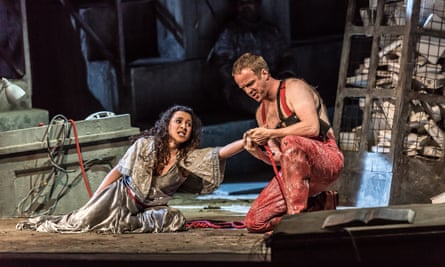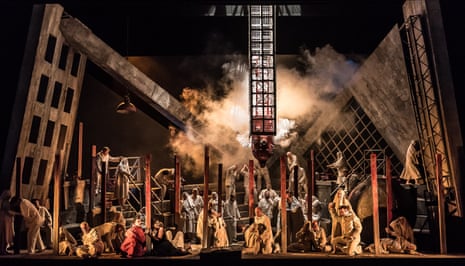Welsh National Opera’s new season forms part of Russia 17, Wales’s arts-wide commemoration of the centenary of the Russian Revolution and, hot on the heels of Mussorgsky’s Khovanshchina at the Proms a few weeks ago, comes this revival of WNO’s 2007 production. It’s a starkly compelling reflection both on the anniversary itself and on the bloody nature of change throughout history: for what emerges is not simply a drama about Mother Russia but the tragedy that unfolds when rival factions within any nation set about each other in a way that spells fragmentation and self-destruction.
The bicentenary of the accession of Peter the Great as Tsar in 1682 was the impulse for Mussorgsky in composing the opera to his own sprawling libretto. Director David Pountney’s staging is set just after the revolution, with the strong, constructivist lines of the late Johan Engels’ design brilliantly channelling El Lissitzky and Kasimir Malevich, but the contemporary resonances are even more chilling today than a decade ago.

The biggest change is that the production is now sung in Russian with subtitles, an initial caption on the frontcloth explaining the significance of the Streltsy, the brutal and debauched militia who support the ambitions of Prince Ivan Khovansky for himself and his son Andrei. Together with the machinations of the corrupt Prince Vasily Golitsyn, former lover of the regent Sophia, and the involvement of the schismatic Orthodox sect, the Old Believers, the complexities of the plot are manifold but, thanks to the clarity of Pountney’s delineation of the different elements and Musorgsky’s artful and deeply Russian characterisations, the work’s essential intensity is always felt.
Performed in Shostakovich’s orchestration – Mussorgsky died before finishing it – the monumentality and theatricality of the concept is convincing, though the endless soul-searching of the non-historical seer, Marfa, sung by Sara Fulgoni, becomes trying, and the paradings of the similarly extraneous Persian slave, danced by Beate Vollack, also drags on. The sheer force of the WNO chorus on stage adds immeasurably to the experience, notably as the fiery Streltsy in act three and most movingly as the Old Believers, opting finally for self-immolation rather than compromise their religious principles.
Robert Hayward’s Ivan is the big vocal presence, but it is the dignified authority of Miklós Sebestyén’s performance as the believers’ leader, Dosifei, that helps carry the evening, and Simon Bailey is similarly imposing as Shaklovity. Tomáš Hanus conducts with passion.
- At Wales Millennium Centre, Cardiff, 30 September and 7 October. Box office: 029-2063 6464. Then touring until 31 October.
- This review was corrected on 27 September to amend the name of the dancer.

Comments (…)
Sign in or create your Guardian account to join the discussion